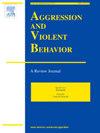A meta-analysis of the relationship between personality traits and cyberbullying
IF 3.4
2区 心理学
Q1 CRIMINOLOGY & PENOLOGY
引用次数: 0
Abstract
Cyberbullying is an interpersonal aggression that has emerged due to the rapid development of the Internet. The present study utilized meta-analysis to explore the relationship between personality and cyberbullying. A comprehensive search of relevant databases included 68 studies with 74 independent samples involving 61,405 participants for the meta-analysis. We investigated the main effects of the Big Five and Dark Triad on cyberbullying behavior and explored the potential moderating effects. The results suggested that Conscientiousness and Agreeableness were negatively correlated with cyberbullying. Neuroticism, Machiavellianism, Psychopathy, and Narcissism were positively corelated to cyberbullying. However, Openness and Extroversion were not significantly associated with cyberbullying. Gender, age, and culture moderated the relationships between personality traits and cyberbullying. Overall, risk personality factors (Neuroticism, Machiavellianism, Psychopathy, and Narcissism) exhibit a stronger link to cyberbullying than protective personality factors (Conscientiousness and Agreeableness), and this study expands the General Strain Theory to General Aggression Models to explain the personality mechanisms of cyberbullying.
人格特质与网络欺凌之间关系的荟萃分析
网络欺凌是随着互联网的快速发展而出现的一种人际攻击行为。本研究利用荟萃分析来探讨人格与网络欺凌之间的关系。通过对相关数据库的全面检索,荟萃分析共纳入了 68 项研究,74 个独立样本,涉及 61 405 名参与者。我们研究了 "大五人格 "和 "黑暗三人格 "对网络欺凌行为的主要影响,并探讨了潜在的调节作用。结果表明,自觉性和宜人性与网络欺凌呈负相关。神经质、马基雅维利主义、变态心理和自恋与网络欺凌呈正相关。然而,开放性和外向性与网络欺凌并无明显关联。性别、年龄和文化调节了人格特质与网络欺凌之间的关系。总体而言,风险性人格因素(神经质、马基雅维利主义、变态心理和自恋)比保护性人格因素(自觉性和宜人性)与网络欺凌有更强的联系,本研究将一般应变理论扩展到一般攻击模型,以解释网络欺凌的人格机制。
本文章由计算机程序翻译,如有差异,请以英文原文为准。
求助全文
约1分钟内获得全文
求助全文
来源期刊

Aggression and Violent Behavior
Multiple-
CiteScore
7.50
自引率
4.30%
发文量
63
期刊介绍:
Aggression and Violent Behavior, A Review Journal is a multidisciplinary journal that publishes substantive and integrative reviews, as well as summary reports of innovative ongoing clinical research programs on a wide range of topics germane to the field of aggression and violent behavior. Papers encompass a large variety of issues, populations, and domains, including homicide (serial, spree, and mass murder: sexual homicide), sexual deviance and assault (rape, serial rape, child molestation, paraphilias), child and youth violence (firesetting, gang violence, juvenile sexual offending), family violence (child physical and sexual abuse, child neglect, incest, spouse and elder abuse), genetic predispositions, and the physiological basis of aggression.
 求助内容:
求助内容: 应助结果提醒方式:
应助结果提醒方式:


